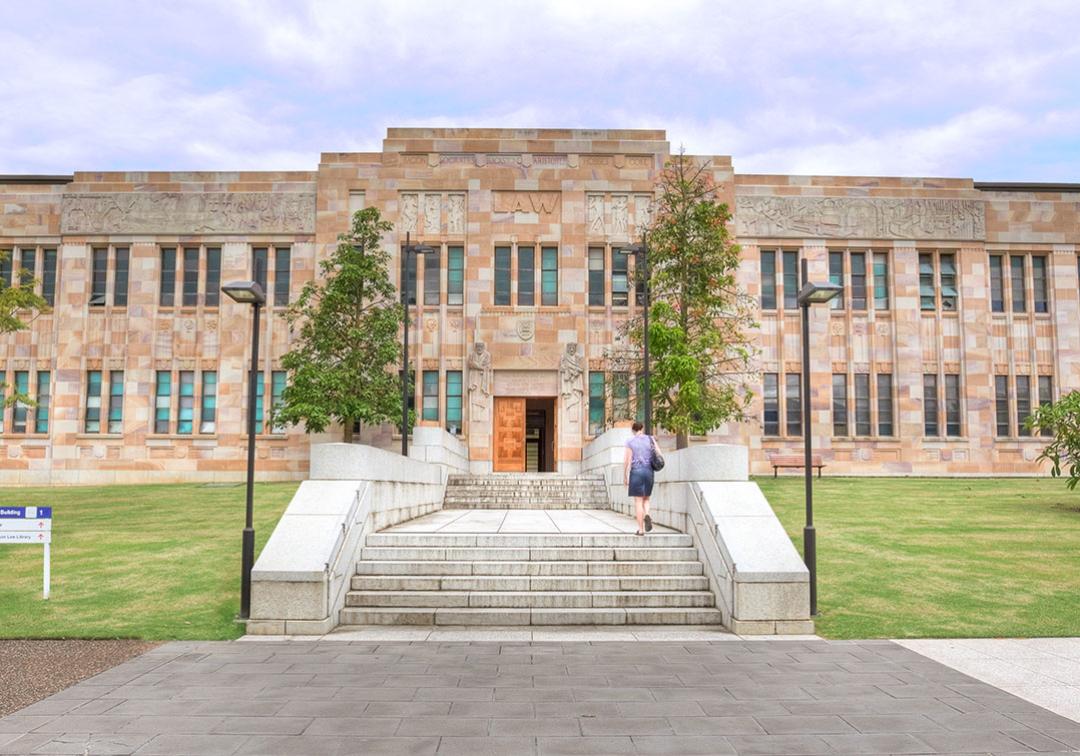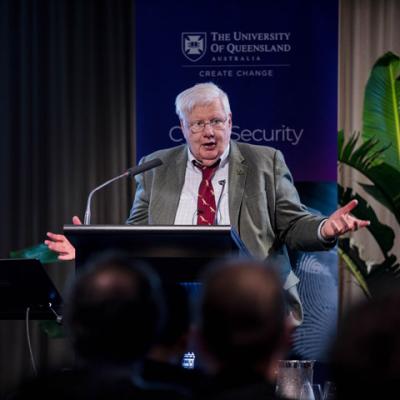
Graduate Certificate in Cyber Security
Overview
Become a leader in cyber security, equipped with new and exciting ways to meet the security challenges of the future.
This six month program aims to create specialists with a deep understanding of cyber security’s impact on every aspect of modern life, and to empower cyber security leaders for a resilient, more productive digital future.
You'll undertake four advanced level courses covering a range of key topics. You'll learn about the major cyber security challenges facing the world and a range of responses, including technical, policy, organisational, governance and geopolitical.
You'll gain integrated learning experience and advance your professional network by working with a cohort with diverse backgrounds from technology, business, mathematics and humanities, unique to UQ.
As a result, you'll be equipped to look at the field from a different angle, ask bigger questions, and find new and exciting ways to tackle real and emerging cyber security threats.
An inter-disciplinary approach
It’s estimated that Australia will need an additional 18,000 cyber security professionals by 2026, so in partnership with industry experts, UQ has developed the first program to genuinely address the interdisciplinary nature of this field, while meeting the need for deep technical specialisation in core areas.
Program highlights
- Study specialised topics such as cryptography, cyber criminology, cyber defence and leadership.
- Gain integrated learning experience and advance your professional network.
- Undertake an industry or research-based project to improve your workforce readiness.
- Acquire a global perspective on cyber security and information security fundamentals.
How you'll learn
Your learning experiences are designed to best suit the learning outcomes of the courses you choose.
- Lectures
- Tutorials
- Work placements
- Laboratory work
What you'll study
At UQ, degrees are called 'programs' and subjects are called 'courses'. Here's a sample of the courses you could study in this program:
- Fundamentals of Cyber Security
- Information Security Essentials
- Cyber Security Governance, Policy, Ethics and Law
- Cyber Criminology and Global Security
Career possibilities
Postgraduate study can take you anywhere. Here are some of the careers you could be on your way to:
- Cyber risk and governance consultant
- Penetration tester
- Cyber security analyst
- IT security specialist
- Cyber security designer
- Risk and compliance analyst
- Cloud infrastructure engineer
- Incident response manager
- Cyber security policy officer
- Domain security architect
Graduate salary
Computing & information systems (postgraduate)
compared.edu.au
Next steps after graduation
- The Australian Cyber Security Market is predicted to triple in size by 2026.
- Cyber security specialist was the #2 emerging job of 2020. (LinkedIn 2020 Emerging Jobs Report)
Events
See all eventsStories
See all stories
UQ people
How the UQ Pro Bono Centre is shaping career-ready graduates
5-minute read

UQ people
The Rhodes Scholar planning to pay her UQ law degree forward
7-minute read
Stories
See all stories
UQ people
How the UQ Pro Bono Centre is shaping career-ready graduates
5-minute read

UQ people
The Rhodes Scholar planning to pay her UQ law degree forward
7-minute read
Entry requirements
Entry requirements
To be eligible for entry, you'll need:
- a bachelor's degree (or equivalent) in any discipline, or
- a graduate certificate or graduate diploma or master's degree in any discipline, or
- to have completed post-secondary studies and 3 years full-time equivalent relevant work experience (see below). Applications based on post-secondary study and/or work experience will be individually assessed.
- a bachelor's degree (or equivalent) in any discipline, or
- a graduate certificate or graduate diploma or master's degree in any discipline, or
- to have completed post-secondary studies and 3 years full-time equivalent relevant work experience (see below). Applications based on post-secondary study and/or work experience will be individually assessed.
Relevant work experience
Relevant work experience includes a minimum of three years' work in a professional, knowledge-based or information-oriented workplace. This may include work in administration, business, customer support, finance, government, human resources, law, marketing, operations/project management, strategy and sustainability. This will need to be supported with evidence.
Evidence of relevant work experience should include a letter from your employer (and/or previous employers) clearly stating the following:
- That you work (or worked) within the specified organisation
- The nature of your work, detailing any relevant duties and responsibilities to the entry criteria above
- The length of time you were in your role/s (i.e demonstrating minimum length for entry) and whether this was full-time, part-time, or casual
- Any further bespoke conditions listed by the entry criteria
Letters will typically be expected to be presented on company letterhead and signed by a manager or HR representative. A CV or resume is not a sufficient document on its own, and must be accompanied by a supporting letter as described above.
All applications based on work experience are subject to an individual assessment.
Entry into a program through work experience does not necessarily provide a pathway into further study in a Masters.
Related programs
Depending on your previous qualifications and current goals, you might want to consider
one of these related programs:
English language requirements
IELTS overall 6.5; reading 6; writing 6; speaking 6; listening 6. For other English Language Proficiency Tests and Scores approved for UQ
TOEFL iBT (including Paper Edition) - Overall 87, listening 19, reading 19, writing 21 and speaking 19.
PTE Academic - Overall Score of 64 and 60 in all sub bands.
BE - A minimum overall grade of 4 plus a minimum grade of C in all macro skills.
CES - Overall 176 and 169 in all sub bands.
OET is not accepted.
There are other ways to meet the English language requirements. For some programs, additional conditions apply.
Inherent requirements
To complete this degree, you have to meet its inherent requirements by demonstrating essential skills and attributes. Read the inherent requirements before you apply.
Student visas
International students who are accepted into full-time study in the Graduate Certificate in Cyber Security are eligible to apply for an Australian student visa (subclass 500).
There are a number of requirements you must satisfy before a visa is granted, including the Genuine Student (GS) requirement.
Fees and Scholarships
Indicative annual fee
Approximate yearly cost of tuition (8 units). Your fees will vary according to your selected courses and study load. Fees are reviewed each year and may increase.
$5,360
2025
Approximate yearly cost of tuition (8 units). Your fees will vary according to your study load. Fees are reviewed each year and may increase.
AUD $26,880
2025
Government assistance
Financial aid
As an international student, you might be eligible for financial aid – either from your home country, or from the Australian Government.
HECS-HELP
Domestic places in the Graduate Certificate in Cyber Security are Commonwealth supported, as long as you meet all Commonwealth supported place eligibility requirements.
This means the cost of your education is shared between you and the Australian Government. Instead of tuition fees, Commonwealth supported students pay what are called student contribution amounts.
If you have a Commonwealth supported place, you may also be eligible for HECS-HELP. This is an Australian Government loan scheme to assist eligible students with the cost of their student contribution amounts.
Centrelink support
The Australian Government offers a number of income-support payments to eligible Australian university students.
Scholarships
You may be eligible for more than 100 scholarships, including:
How to apply
Applying online
All international applications should be submitted to UQ. If you prefer, you can use an approved UQ agent near you.
The program code for the Graduate Certificate in Cyber Security is 5251.
Applying online
All domestic applications should be submitted to UQ.
The program code for the Graduate Certificate in Cyber Security is 5251.
Important dates
The closing date for this program is:
- To commence study in semester 2 2025 - 5 May 2025 (with offer acceptance due 18 May 2025).
- To commence study in semester 1 - November 30 of the previous year.
Visa processing times vary. Apply and accept your offer as early as you can.
To learn more about UQ dates, including semester start dates, view the Academic Calendar.
Important dates
The closing date for this program is:
- To commence study in Semester 1 - January 31 of the year of commencement.
- To commence study in Semester 2 - June 30 of the year of commencement.
To learn more about UQ dates, including semester start dates, view the Academic Calendar.
Aboriginal and Torres Strait Islander applicants
For support with applying – or if you have any questions about university life – get in touch with our Aboriginal and Torres Strait Islander Studies (ATSIS) Unit.
Explore other programs
Express yourself. And your interest.
They say choosing a degree is hard, which is why we've made it easy. Register your interest and we'll send you everything you need to know about applying to UQ.






